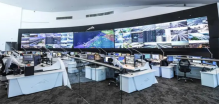“Maturing AI capabilities will have a significant impact on 5G and existing networks' automation and evolution,” said the head of Ericsson Canada, Graham Osborne.
The Swedish firm, which already has 1,000 employees working on R&D in Montreal, said it plans to recruit more than 30 people this year, and possibly more in years to come. Its investment over five years is expected to total USD $29.7 million.
Canada's second-largest city is hoping to become a major hub for AI research, building on the expertise of globally-recognized local experts like Yoshua Bengio.
“The leadership shown by governments in Canada has helped create a robust Montreal AI ecosystem with world-class talent from which we can recruit,” said Osborne.
In late 2016, Google opened an AI lab in Montreal to work on systems capable of understanding and producing a natural language - one that evolves and develops through use and repetition. The following year, Microsoft acquired Canadian deep learning start-up Maluuba, which specialized in natural language understanding by machines. Then later in 2017, Facebook set up its second AI lab outside the United States in Montreal.


















